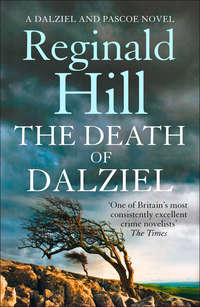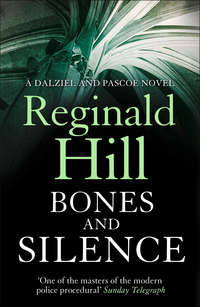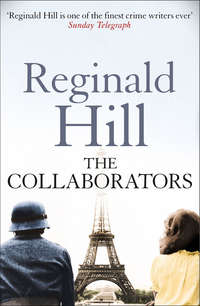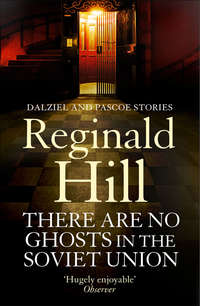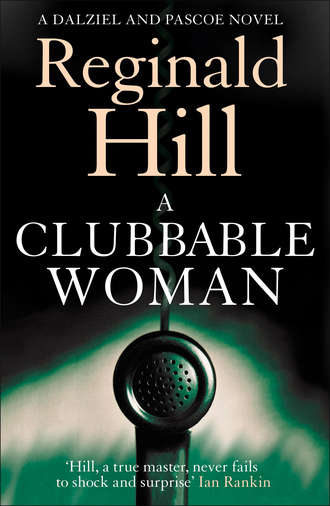
Полная версия
A Clubbable Woman
‘Do we have to have that tripe on?’ asked Dave Fernie.
‘Please yourself,’ said his wife. ‘You usually like it. All those girls. You must be getting old.’
‘Too old for that.’
Alice Fernie glanced across at her husband with a smile, half ironical, half something else.
‘Old enough for what, then?’
‘Aren’t you going to switch it off?’
‘I didn’t switch it on.’
‘No. I did. So you could see your precious football results after you rushed back from your precious match. And when you didn’t come, I even marked them down for you. Don’t you want to see?’
Fernie reached across and took the paper from the arm of his wife’s chair.
‘Thanks,’ he said.
The singer was off again, alone this time; a ballad; his voice vibrant with sincerity.
‘For God’s sake, switch that bloody thing off, will you!’
Angrily she rose and pulled the plug out of its socket.
‘I don’t know what’s wrong with you these days. I’m getting pretty near the end of my tether with you. Other women wouldn’t put up with what I do.’
Fernie ignored her and peered down at the newspaper, but she sensed he wasn’t really seeing it. She stood in the middle of the room and glowered down at him. He was in his early thirties, the same age as herself, but there was a puffiness about his face and a sagging at the belly which made him look older. Normally the contrast to her own advantage pleased her. Now she screwed up her face in distaste. Then, quickly as it came, her anger drained from her and she sat down again.
‘Are you ready for your tea yet?’
‘No, love. I told you I wasn’t hungry.’
‘Is there anything bothering you, Dave? Are you feeling all right?’
She steeled herself for the irritability her concern for his health always seemed to cause, but unnecessarily.
‘No, I’m fine.’
‘You were late tonight.’
‘Yes, I’m sorry. I got held up. It was a good gate. I met his lordship on my way up the road.’
He jerked his head towards the window which faced the street. Alice affected not to understand.
‘Who’s that you mean?’
‘You know who. Connon. Bloody twat.’
‘Why? What’s he ever done to you?’
‘Nothing,’ he grunted. ‘I just don’t take to him, that’s all. Too bloody standoffish for me.’
‘That’s what he was. A stand-off.’
‘A what?’
‘Stand-off. His position at rugby. Mary told me.’
Fernie laughed. ‘Stand-off, eh? That’s bloody good. Wait till I tell them on the bench. That fits him.’
‘Anyway I think you’re wrong. When I met him he was very nice. Charming. A bit quiet perhaps but he’s just a bit shy, I think.’
‘If he’s shy he shouldn’t be a bloody personnel manager, should he? Anyway he’s more than that. He’s a snob.’
Alice laughed with a slight edge of malice. ‘I’d have thought you could say that about Mary Connon. But not him.’
Fernie shook his head dismissively. ‘Her. That’s different. She’d like to be better, but knows she isn’t. He believes he is. Bloody rugby club.’
‘Oh, Dave, don’t be daft. It’s not like that these days. Anybody plays rugby. Maisie Curtis’s boy next door, Stanley, he’s in the Club.’
‘So what? Things don’t change all that quick. What a game. Organized thuggery, then they all sing dirty songs like little lads. Yet they all tut-tut like mad if one of our lads runs on the field and someone shouts “shit” from the terraces.’
‘There’s no need to get excited, Dave.’
‘No? No, I suppose not. Here, I think I’m ready for my tea now.’
Alice rose and went into the kitchen.
‘I’ll tell you something about your precious stand-offish Mr Connon, though.’ His voice came drifting after her.
‘What’s that, then?’
‘He’d had a couple tonight. He was swaying around a bit. And I thought he was going to drive across his lawn and in through the front door.’
Alice came back to the sitting-room door.
‘That doesn’t sound like him.’
‘Doesn’t it? Don’t tell me that you’ve only heard good of him from Madam Mary?’
‘She doesn’t talk much about him at all.’
‘I don’t know why you bother with her. You’ve only got your age in common.’
Alice took an indignant step forward.
‘What do you mean? I can give her ten years, and more.’
Fernie caught her hand and pulled her down beside him on the settee.
‘As much as that? Mind you, she’s well preserved. And game too, I should think.’
‘I don’t know what you mean,’ said Alice, struggling to get up.
‘She must have caught him young then, very young. He’s only thirty-nine, you know.’
‘How do you know?’
He didn’t answer but went on, ‘And they’ve got that girl of theirs …’
‘Jenny.’
‘Yes, Jenny, at college. He must have been caught young. Very young. She’s a pretty little thing, now.’
‘Don’t you want any tea, Dave?’
Fernie’s brawny arm held his wife in a clamp-like grip round the waist. He looked thoughtfully into her face, then pressed gently with his free hand where it rested on her leg just above the knee.
‘No,’ he said, ‘I think I’ve changed my mind again.’
Jenny Connon hadn’t quite made up her mind what to do about the hand on her knee. Adaptability was an important quality in a teacher, her education tutor had told the class that morning. How to cope with the unexpected.
Though, as she herself had arranged that her roommate should go out and she herself had turned the key in the door to prevent interruption, the situation was not all that unexpected.
‘Do you really want to be a teacher?’ she asked brightly.
Antony (he insisted on the full name) pushed the hair back from his brow with a gesture almost girlish (but he used the hand not on her knee) and smiled.
‘If you mean, have I got a sense of vocation, no. If you mean, are my natural inclinations to be something else being repressed, the answer is equally no. Being at college is less distasteful than most of the alternatives, and it pleased my parents. Anyway, think of the holidays. I have a sense of vacation very strongly developed.’
Antony Wilkes was without doubt the smoothest man in the South Warwickshire College of Education at the moment. As he was in his third year and Jenny was in her first, the opportunities for the relationship to develop were limited. As it was, Jenny had decided to feel flattered that she was the second girl he had chosen from the year’s new supply. Her college ‘mother’ in the second year had assured her (rather sadly) that Antony was most discriminating in his selection. Her room-mate had been even more positive. She had been the first of the year. This gave Jenny the advantage of being well briefed in the Wilkesian technique, but being forewarned she was discovering did not prevent her from being disarmed. Antony was one of the few people she had met who really did talk in long well-organized speeches like people in plays. Most of her acquaintance, she realized, hardly ever strung together more than a couple of dozen words at a time except when telling an anecdote, and in fact the few who did talk at length were down in the catalogue as bores and therefore to be avoided.
But Antony talked eloquently, interestingly, without strain; with none of those changes of direction, grammatical substitutions, syntactical complexities, whose existence her linguistic lecturer assured her was the real framework of the spoken language.
His speech, Jenny decided, was the smooth, reassuring surface of his amatory technique. Even the slight sense of staginess it conveyed worked for him, creating a faintly non-real, therefore non-dangerous, context. But beneath the surface …
The obvious survival tactic was to stay afloat. She seized at a bit of driftwood in his last speech.
‘Is it important to please your parents?’
‘But of course. It’s important to please everyone who deserves it, even a little beyond desert if possible. Financially it’s not important. My father has a strict scale of values. He gave me the precise amount necessary to bring my grant up to the level he has worked out to be sufficient for my well-being. Less would be neglect; more would be luxury. So I never get more or less for any reason. And to use money as punishment or reward is quite out of the question.’
‘He sounds like a Puritan banker.’
‘Not at all. If you wish to combine his religion with his profession, you’d have to call him an Aston Villa butcher. Mind you, my mother slips me the odd note now and then. But, as I say, this has nothing to do with the question. The only real answer is that, despite the fact that in many ways they find me utterly incomprehensible, they have always felt inclined by nature to please me; similarly I them.’
‘You mean you love them?’ asked Jenny, half-consciously trying to embarrass him.
‘Yes, of course. Had I not made that clear? I’m sorry. And you, do you love your parents?’
‘Yes, I think so. My father, I like him a lot and we mean a lot to each other. It’s a matter of talking and understanding, but my mother’s different. Irritating in so many things. I want to scream at her sometimes.’
‘But you never do?’
Jenny grinned. She had tried to stop grinning. She thought it made her face fall apart in the middle, and she still had to count her teeth to assure herself she had not got twice as many as other people. But she kept on forgetting.
Antony Wilkes was glad she forgot.
‘Oh, sometimes. I give a quick forty-second-psycho-analysis. Rather nasty stuff it can be. She’s a bit of a snob; uses me to get at Dad, whom she resents in some odd way. She’s a few years older than he is, though I only use that as a last resort. I don’t know why, I suppose I just know that for her age is the ultimate insult, stuck a long way after vanity and dishonesty! But sometimes I feel I’m a lot more like her than Dad, than I’m like Dad I mean, though I like him more.’
Ruefully she compared her own performance as a speech-maker with Antony’s. Still, it wasn’t all that bad. And her hesitancies arose from uncertainties of emotion. Perhaps it would have flowed more smoothly if she hadn’t been so aware of the tensions, the fight for survival at home.
Antony’s hand patted her knee sympathetically. She realized that her attempt to stop on the surface had somehow gone wrong. She had entered into a conversational intimacy with him without even noticing it. She would have to keep very much on the alert now. His other hand was pressing her shoulders round. She turned to him and he kissed her. She’d have to do something about his other hand. But not yet. Mini-skirts and tights, she thought dreamily. Action and reaction. The invitation to attack might be more compelling than ever before, but the defences were stronger. She grinned again, which produced a very invigorating kind of kiss.
She could postpone her decision for a while yet.
‘Christ, Marcus, where the hell have you been? You just said half an hour. It’s been more like an hour and a half.’
Marcus Felstead manoeuvred his bulk under the flap into the bar.
‘Sorry, Ted, old son. Got held up a bit. Look, have a pint on me and push off now. I’ll spell you when you’ve got a Saturday.’
‘OK. And I’ll have that pint. I’ve been so bloody busy that not a drop’s passed my lips since you left.’
‘It’ll do you good. Give you an edge when they start fighting for the spare.’
‘Some hope. There won’t be much of that around now. See you, Marcus, Sid.’
Sid Hope, the club treasurer, looked askance at Marcus.
‘Nice of you to come back and give us a hand.’
‘Come off it, Sid. I did get Ted to stand in.’
‘Ted! Have you seen him at the till? He’s got some peculiar decimal system of his own. Where have you been to anyway? On the prowl?’
‘Nowhere important. Just out.’
A peal of uninhibited female laughter cut through the noise and fume of the bar. Marcus turned. Sitting in the furthermost corner surrounded by half a dozen men was the woman he expected to see after hearing that laugh. Dressed in a low-cut cocktail dress whose demure whiteness set off the gleaming black of her hair and the shining silver of her tights, she was looking up and smiling at the young man who bent over her, obviously telling a story.
The treasurer followed Marcus’s gaze and shook his head.
‘Trouble,’ he said laconically.
‘What do you mean?’
‘You know what Arthur is. He’s been hopping around like a cat on hot bricks all evening waiting for his precious wife to turn up. Finally off he goes about half an hour ago to fetch her. Decides she must have forgotten. Forgotten! Well, he’s hardly out of the place before she comes sailing in like the figurehead on the good ship Venus. And of course within two minutes of coming into the most crowded room in the county with a queue six deep at the bar, she’s sitting in the corner surrounded by drinks. Just wait till Arthur gets back.’
Sid drew a couple of pints for a complaining customer, then looked over at Gwen Evans again.
‘Mind you,’ he said, ‘what a pair of bristols, Jesus! There hasn’t been anything like that in here since Nancy Jennings went off with that traveller. And Mary James – Connon, I mean – was the only thing I’ve ever known who could have beaten it.’
‘Connie’s wife?’
‘Yes. She doesn’t get in here much now, does she? Nor does Connie for that matter. But I can remember the days. Jesus! Connie was married when you came to live here, wasn’t he, Marcus?’
‘Yes. Just.’
‘It must have been a full-time business with that one. No wonder he lost his edge after that. God, he once looked a cert for a cap. First we’d have ever had. Never been a sniff since. All for love.’
Marcus poured himself a scotch.
‘He did crack his ankle.’
‘Of course he did. I’m not really suggesting, mind you, that kid of theirs came out pretty smartly. Like Connie’s pass, they said. And the responsibility can’t have helped. But they seemed to make out all right. Didn’t see all that much of Mary after that. But it was before. Like her over there. And Nancy Jennings. Trouble.’
Marcus, his eyes still fixed on the noisy corner, ran his glass along his lower lip.
‘Are you putting forward as a general proposition, Sid, that women with big breasts cause trouble?’
‘Not absolutely. Though there’s a bit of truth in it, isn’t there?’
‘Mary Connon never caused any trouble down here that I saw.’
‘Like I said, after they married, she didn’t get in here so much. Tailed off. That’s an apt phrase if you like. She was six years older than him, you know.’
‘Still is, isn’t she?’
‘You know what I mean. She’d had her fling down here. Not here exactly. That was in the days before this bloody roadhouse came into being. Remember? We had the tea-hut. None of your polished floors. You could get splinters through your shoes if you weren’t careful. Then over to the Bird-in-Hand. No, Mary did the right thing – for her, anyway. Married someone half a dozen years younger. And stopped coming so much. Nancy Jennings, she buggered off. It’s when they marry someone ten years older than themselves and keep their wares in the shop window that the trouble starts. Here, my lad, if you’re going to have another whisky, pay for the last one first.’
‘Sorry, Sid. There it goes; and for this one too. Witnessed?’
But Sid wasn’t paying attention.
‘Here we go,’ he said in a low voice. ‘Here we go.’
Marcus had never seen anyone whose face was really black with rage, but Arthur Evans was pretty close to it as he pushed through the door. A path opened up before him. It led to the corner where his wife sat. She looked up, flashed him a quick smile, then returned her attention to the youngster who had been talking to her. But he had seen Arthur too and seemed disinclined to talk further.
With a tremendous effort, obvious to all who watched, which was about three-quarters of those in the room, Arthur turned to the bar. Marcus could almost feel the man’s will forcing his broad shoulders to turn. Then his trunk followed. And finally his legs.
Quickly Marcus thrust a glass up against the whisky optic. And again.
‘Arthur, old son, I’m in the chair. Wrap yourself round this and tell us about your childhood in the green valleys of old Wales.’
Evans took the drink in one.
‘Thanks,’ he said.
Over his shoulder, Marcus saw Gwen casually disengaging herself from the group in the corner. Exchanging a word here and there as she came, she passed easily across the room till she arrived at her husband’s shoulder.
‘Hello, dear. Going to buy me a drink? I’ve got no money and I can’t sponge off your friends all night.’
‘Where’ve you been, Gwen?’
She smiled ironically.
God, you’re a beauty, thought Marcus. Sid, in an excess of desire to share his admiration of the sight before them, kicked him painfully on the ankle.
‘Oh, I got tired of waiting, so I came on by myself.’
‘But you were supposed to be coming with Dick and Joy.’
‘Was I? Oh, I forgot.’
‘They called for you.’
‘Then I must have left.’
‘To come here? You took your time, didn’t you, girl?’
‘Do you want to quarrel, Arthur?’
She raised her voice just sufficiently to cut into the attention of those immediately adjacent to them.
Marcus looked at Arthur. Surprisingly, he seemed to be considering the question on its merits.
Finally, calmly, ‘No,’ he said.
‘Then let’s have that drink. Marcus, love, see if you can add a bit of gin to that slice of dried-up lemon which seems to be all that’s left of a once proud fruit.’
‘A pleasure, ma’am,’ said Marcus. ‘A real pleasure.’ He meant it.
Two hours or so later, just after eleven, he put the lights out in the bar. Outside he could hear the din of departure. Car doors. Impatient horns. Voices. Song.
As he passed the Gents, the door opened and a large figure fell out.
‘Marcus,’ it said.
‘Ted. Christ, you certainly caught up, didn’t you? Come on, old son. We’d better get you home.’
Arm in arm they walked out into the car park.
Jenny Connon opened the door to let her roommate in.
‘Hello,’ said the newcomer brightly. ‘Not too early, am I? It’s after eleven.’
‘What you really mean is, not too late, you hope. How are you, Helen?’ said Antony. ‘Well, must be off. See you both. Bye.’
Jenny watched him go down the corridor.
‘Had a nice time?’ asked Helen.
‘Oh yes,’ said Jenny noncommittally as she closed the door. She hoped she had done the right thing.
‘The time is ten minutes past eleven,’ said the announcer with evident relief. ‘You are watching …’
Alice Fernie switched him off in mid-sentence and yawned.
‘Well, I’m off to bed. Coming?’
Behind her, her husband stood in the small bay of the window looking out into the front garden.
‘No, dear. You go on. I’ll be up in a minute.’
‘What are you looking at?’
‘Nothing. I thought I saw that bloody black and white cat from next door digging up my lawn. Off you go.’
‘All right, then. Good night.’
‘Good night.’
And over the road, Sam Connon stood pale-faced and trembling in the darkened hall of his house, the telephone in his hand.
Behind him in the lounge, stretched out in the high-backed chair he would never want to call his own again, was his wife.
She was quite, quite dead.
Chapter 2
Superintendent Andrew Dalziel was a big man. When he took his jacket off and dropped it over the back of a chair it was like a Bedouin pitching camp. He had a big head, greying now; big eyes, short-sighted, but losing nothing of their penetrating force behind a pair of solid-framed spectacles; and he blew his big nose into a khaki handkerchief a foot-and-a-half square. He had been a vicious lock forward in his time, which had been a time before speed and dexterity were placed higher in the list of a pack’s qualities than sheer indestructibility. The same order of priorities had brought him to his present office.
He was a man not difficult to mock. But it was dangerous sport. And perhaps therefore all the more tempting to a detective sergeant who was twenty years younger, had a degree in social sciences and read works of criminology.
Dalziel sank over his chair and scratched himself vigorously between the legs. Not absent-mindedly – nothing he did was mannerism – but with conscious sensuousness. Like scratching a dog to keep it happy, a constable had once said within range of Dalziel’s very sharp hearing. He had liked the simile and therefore ignored it.
‘You should have seen him, Pascoe. He went round their cover like a downhill skier round a line of snowmen. And he was a big lad, mark you. Still is, of course. But even then. Not one of your bloody Welsh dwarfs, but a good solid-built English fly-half. How we roared! He’d have captained the Lions if we’d been selectors.’
‘Yes, sir,’ said Sergeant Pascoe with the resigned condescension of one certain of the intellectual superiority of Association Football.
‘Graceful, too. Ran upright. Always looking for the quickest way to the line. God, he found it that day. He was picked for the final trial, of course. Nearest thing to a certainty since Lily Jones left Crown Street. Then bang! his ankle went. The week before. No one’s fault. He was overtaken by a loose scrum. Never afraid to mix it, was Connie. Solid defender, sharp attacker. But he never came again after that. Played for another eight years. No difficulty in holding his place in the club. Stood up for the County a dozen times. But never sniffed at a cap again. But he was a great runner with the ball, a great player.’
He nodded two or three times and smiled faintly as though at some pleasant memory.
‘A great player.’
‘Then he could hardly commit a murder, could he?’ said Pascoe, hoping by this irony to recall his superior to the realities of their work.
‘No. Probably not. Or not one like this. He’d use his head, that one. Which,’ added Dalziel, standing up and walking to the window, ‘is what you should do, Pascoe, before wrapping up another of your little ironies for me.’
Pascoe refused to be squashed.
‘Perhaps he is using his head, sir. Perhaps he is, in the sporting idiom, selling us a dummy.’
Dalziel flung up the window with a ripping sound from the parts where the paint had fused, and let in a solid cube of icy air which immediately expanded to fit the room.
‘No one ever sold me a dummy. Point yourself at the man and bugger the ball, you can’t go wrong.’
‘But which man?’ said Pascoe.
‘No,’ said Dalziel, slapping his thigh with a crack which made Pascoe wince, ‘at this stage the question is, which bloody ball? Is that enigmatic enough for your scholarship, eh?’
Pascoe had grown used to jokes about his degree when a constable, but Dalziel was the only one who hung his wit on it now.
The trouble is, he thought, looking at the broad slope of the back whose bulk stopped the light but not the draught, the trouble is, deep down he believes that everyone loves him. He thinks he’s bloody irresistible.
‘What did you make of him last night anyway?’
‘Not much. That doctor of his had pumped him full of dope and was hovering around like a guardian angel when I got there.’
Dalziel snorted.
‘At least you saw him. He was tucked up in bed by the time I arrived. I’d have liked a go at him while the iron was hot.’
‘Yes, sir. The early bird …’
‘Only if it knows what it’s all about, Pascoe.’
Pascoe did not let even the ghost of a smile appear on his lips. He went on speaking.
‘In any case, the iron wasn’t all that hot at eleven. She’d been dead at least three hours, possibly five. The room temperature seems to be a rather uncertain factor. Signs of a big fire, but the place was like an ice-box by the time we got there. That was a sharp frost that set in last night.’


